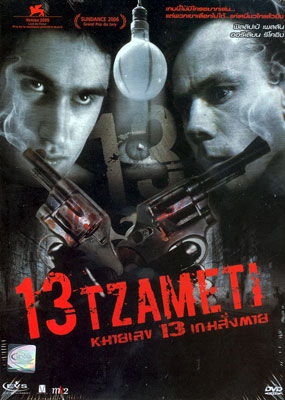
TZAMETI (THIRTEEN)
France, 2005, 86 minutes, Black and white.
George Babluani, Pasquale Bongard, Philippe Passon, Aurelienne Recoing.
Directed by Gela Babluani.
A surprising film. The director is from the old Soviet republic of Georgia. His father is a noted director and sent his son to France to be educated. In this first feature, we can discern a sympathy for the experience of Georgians trying to survive in France and a French perspective on society and morals.
The film was shot in black and white, reminiscent of visual styles and compositions of past times, even the silent era. When the themes finally emerge, one is relieved that the film is in black and white.
How much to say about the plot? Having seen the film without knowing anything of the plot, I shared the experience of the 22 year old builder who steals a train ticket that he feels will lead him to extra money for his family. It does, but not in the way he or we could have anticipated. After the quiet opening, watching him at work and helping a housekeeper revive the middle-aged addict she looks after, we set out on the young man’s journey.
Maybe, it is best just to say that violence is the theme of the film, especially in the context of French macho attitudes and its gun culture. It is alarming.
This is a powerful and sombre film that reminds us that film-making can go well-beyond movies as a pastime.
1.A first feature? Awards and acclaim? Impact?
2.The perspective of a Georgian film-maker? Migrants from eastern Europe? France? The French perspective and the director’s life in France? His admiration for French films – Melville, Bresson…?
3.The quality of the black and white photography, the purist style, the homage to the silent era, to the classic French directors? The musical score?
4.The worlds of reality and unreality? Migrants living on the coast, the workplaces? Travels? The world of the betting and the shooting?
5.Sebastian as a twenty-two-year-old? His coming home, helping his parents, earning? His father limping and going out to work? His grandfather at home? His mother? Domestic sequences, the meals? His being a migrant, coping?
6.Sebastian at work, on the roof? Conscientious? His being called to help the woman and the man who had taken the drug overdose, walking him on the beach, taking him back to the house? Her call when he had overdosed in the bath? His listening to the man, his visitors, his curiosity roused? The ticket blowing out the window, his taking it? His decision to follow through, the possibilities – and audiences’ expectations of his being a drug courier?
7.The police surveillance, the photos being taken, the drug addict going to the letterbox, getting the mail? The investigation? The woman and her manner – and the irony that she was police? Her attitude towards Sebastian, his not getting paid, the sister selling the dead man’s house? The other police, contact by phone, the role of the squad, those efficient, those inefficient? Checking on Sebastian in the train? His ticket and where he was getting off, the cars? The methods of surveillance? The irony of losing him?
8.Sebastian, the train ride, going to the locker, getting the details, the number thirteen? The driver, his being left stranded on the highway? Being picked up?
9.His going to the house, his initial reactions, curiosity? The different personalities in the group, the types?
10.The revelation of the gambling, the nature of the gambling, the Russian Roulette with each man playing against the other? The details of the ritual, inserting the bullets, rolling the chamber, cocking the revolver? The lamp and the focus on the lamp? The MC and his organising the ritual? The various stages and audiences being led from one session to the other? The removal of the bodies, the bags? The casual approach of the people there, the woman coming in, the cleaning, the bar, the beds for people to lie down and have a rest?
11.The betting, the desperation of the men, the amounts of money being bet? The control? The man who decided to help Sebastian, encourage him?
12.Sebastian’s fears, his not being able to shoot, his own fear of being shot? The uproar and the men shouting for him to shoot?
13.The succeeding rounds, his surviving, number six and his brother, the taunts? The fat man? The other survivors?
14.The duel, the numbers, six versus thirteen? Neither having a bullet at the first attempt? Sebastian being quicker and shooting number six?
15.The aftermath for himself, his experience, conscience? The amount of money won? Having to give a tip to the counter, to the man who had sponsored him? His attempts to escape earlier, his finally escaping, his clothes, watching in the woods, getting the licence number of the man who stopped?
16.The police, the questioning of Sebastian, his eating his receipt, the plausibilities of all his answers, his being allowed to go?
17.His posting the money, the phone call to his father? On the train, the encounter with the brother, his being shot? The film leaving everything at that?
18.The experience of the migrant, the young man with his life before him, the culture of men and their vicious betting, the culture of the gun, brutality – as experienced in France?